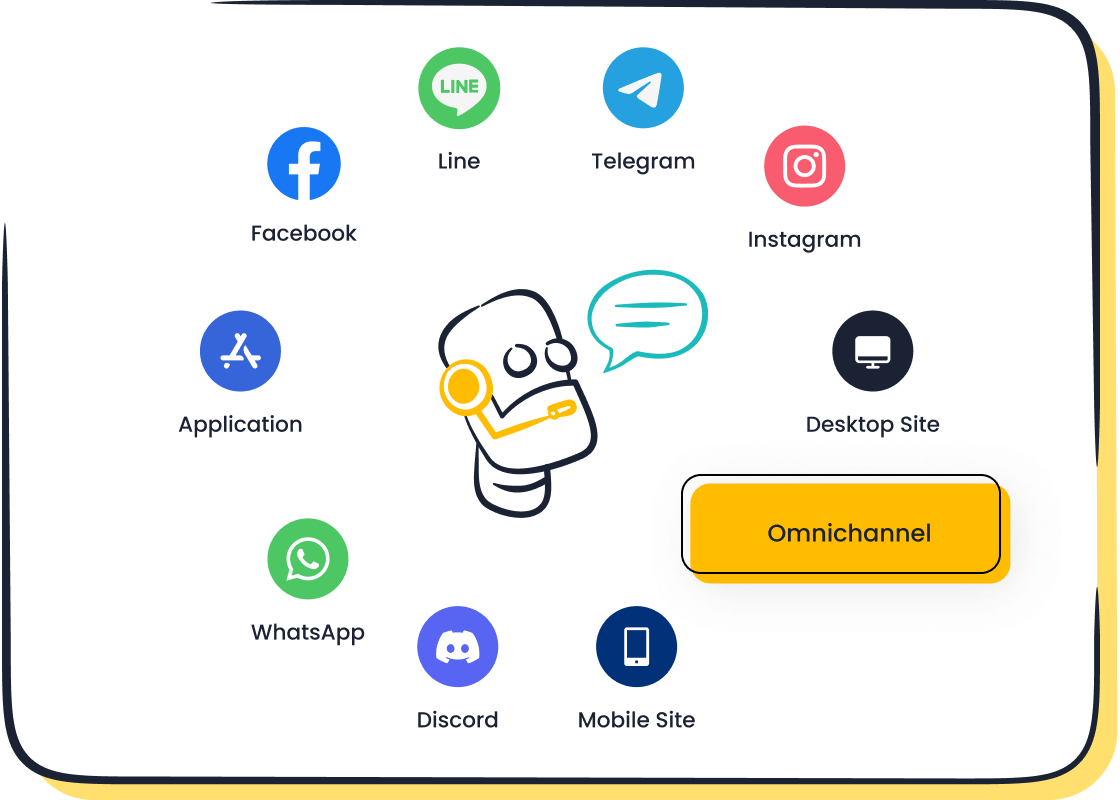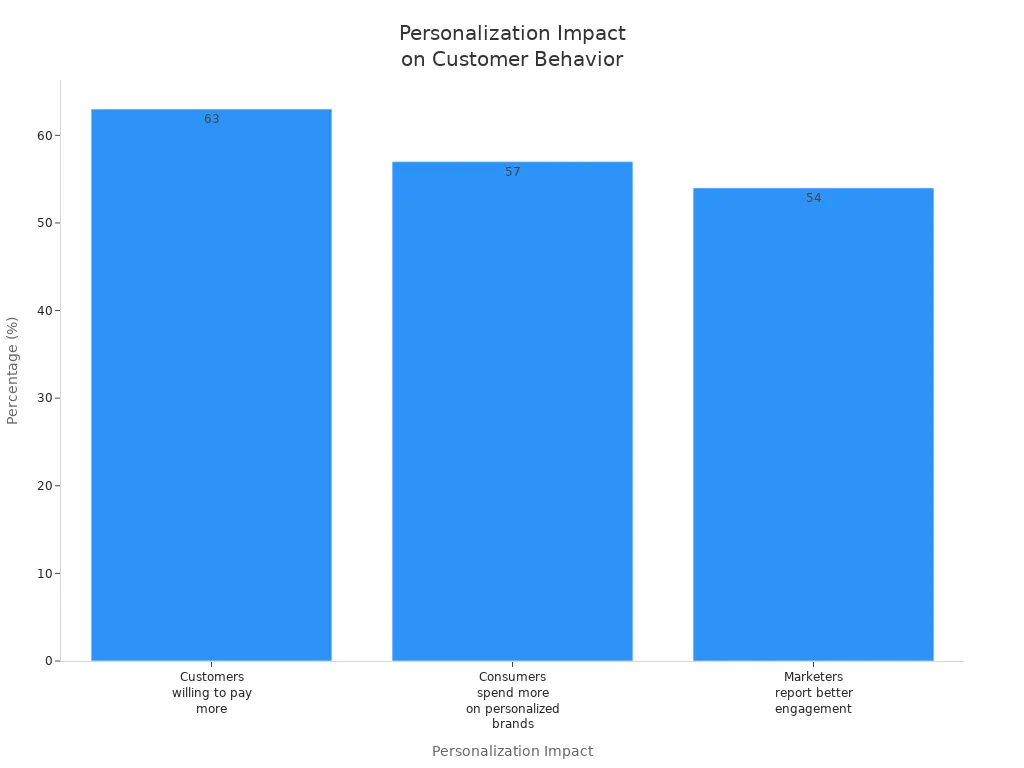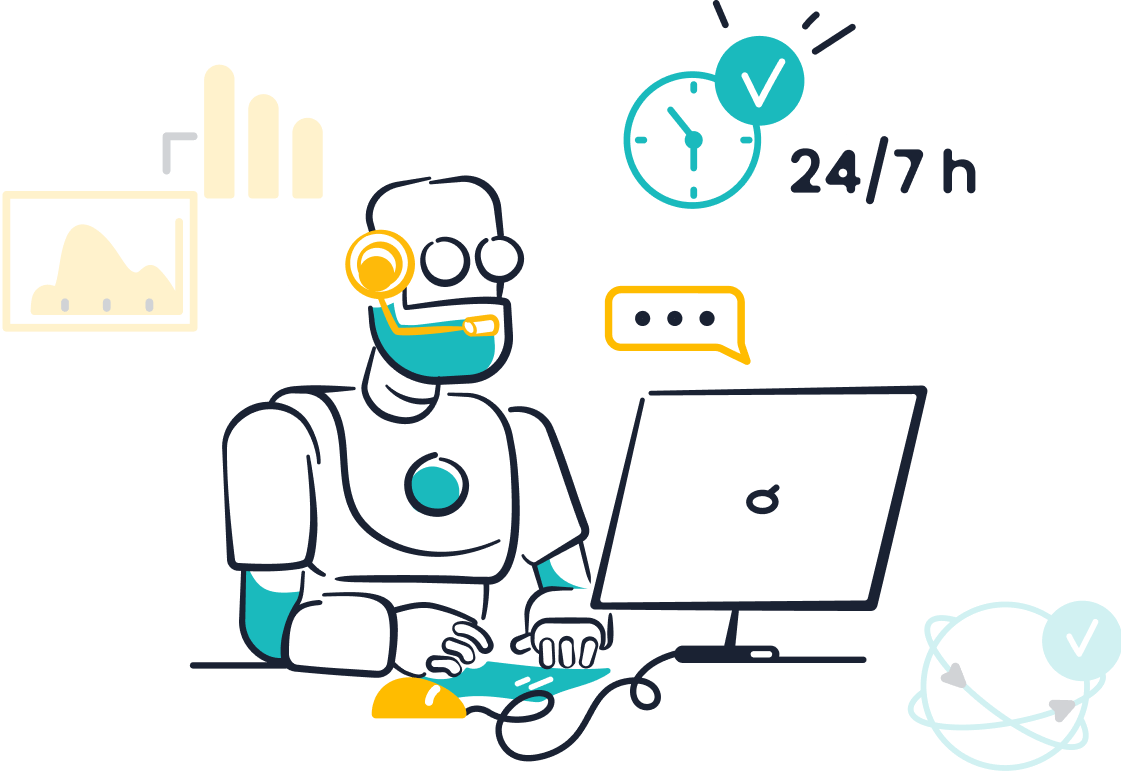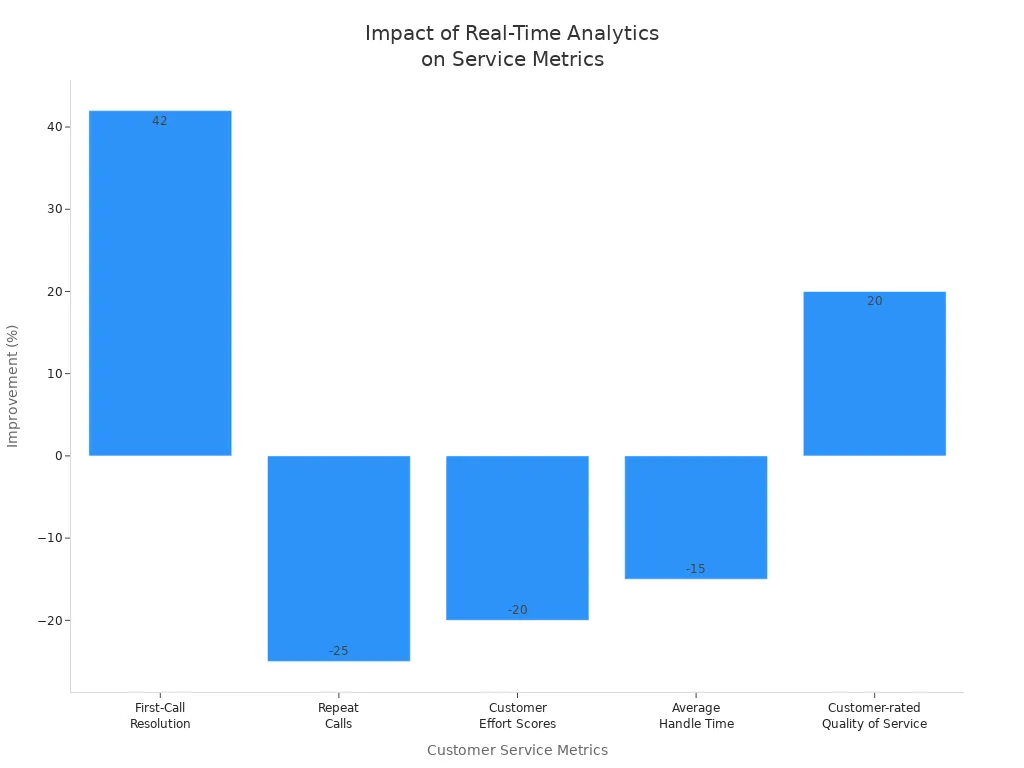Emerging Trends Shaping Ecommerce Customer Service Software

Top 2025 trends in ecommerce customer service software include AI-powered automation, omnichannel integration, and real-time personalization. Brands that embrace these advances see higher customer satisfaction, faster response times, and stronger loyalty. AI now handles millions of customer service interactions daily, shaping the future of online retail. Sobot leads this change with Sobot AI, delivering seamless support and smarter customer service across digital channels.
AI in Ecommerce Customer Service Software

Generative AI
Generative AI has become a game changer for customer service in ecommerce. Companies now use AI to create personalized product recommendations, marketing emails, and even virtual try-ons. This technology helps brands connect with shoppers in new ways. For example, Stitch Fix uses generative AI to suggest outfits based on customer preferences, which increases sales and customer satisfaction. Alibaba relies on AI to improve supply chain management and product suggestions, reducing shortages and overstock. According to recent surveys, 92% of service professionals say generative AI improves customer service and leads to higher satisfaction scores. AI-powered chatbots now provide 24/7 support, reducing wait times and making sure customers get answers quickly.
Generative AI also helps agents by drafting emails and summarizing chats, so they can focus on complex issues. This leads to faster response times and better experiences for everyone.
| Company | AI Technology Used | Impact on Customer Service (2025) | Key Metrics / Outcomes |
|---|---|---|---|
| Eneco | Multilingual AI agent with Copilot Studio | Handles more chats, reduces human intervention, speeds responses | 24,000 chats/month; 70% more managed by AI |
| Meesho | Azure OpenAI Service, Copilot | Improves satisfaction, increases query traffic | 25% higher satisfaction; 40% more service queries |
| Mahindra Group | Multiagent AI System | Enables hyper-personalized communication at scale | Improved engagement and verification |
Automation
Automation in ecommerce customer service software reduces response times and operational costs. AI agents handle repetitive questions, such as order tracking, instantly. This allows human agents to focus on more complex problems. Automation also uses scripts and templates to answer common queries faster. Teams can prioritize urgent issues and manage communication from one dashboard, which saves time and money.
- Automation provides instant, personalized responses, lowering the workload for agents.
- Automated ticket sorting helps teams focus on urgent cases.
- Self-service options deflect repetitive tickets, reducing costs.
- Brands like Jaxxon saw a 17% drop in live chat volume and a 6% increase in conversion rates after using automation.
Sobot Chatbot

Sobot’s AI-powered chatbot stands out in enhanced customer service. It operates 24/7, solving regular queries and assisting agents. Businesses using Sobot’s chatbot see productivity rise by up to 70% and save up to 50% on agent costs. The chatbot supports multiple languages and works across channels like WhatsApp and SMS. Sobot’s no-code setup makes it easy for any team to deploy. With smart self-service and proactive messaging, Sobot’s chatbot boosts conversions by 20% and helps companies gain more leads while reducing service costs. This approach ensures higher customer satisfaction and efficient customer service for ecommerce brands.
Omnichannel Trends
Unified Support
Unified support has become a cornerstone of modern customer service. Customers now expect to interact with brands through many channels—chat, email, phone, social media, and messaging apps. Over 73% of shoppers use multiple channels during their journey, and 86% expect a consistent experience across all touchpoints (Forbes, 2023). Unified support ensures that every interaction feels seamless, no matter where it starts or ends. This approach builds trust and encourages repeat purchases. Brands that deliver consistent service and branding across channels see higher customer satisfaction and loyalty. Unified support also enables faster responses and more efficient issue resolution, which are key drivers of proactive customer support.
- Customers value consistent service quality across all channels.
- Unified support reduces customer effort by providing access to profiles and history.
- AI-powered tools and human agents work together to personalize the journey.
Seamless Integration
Seamless integration is essential for delivering proactive customer support and a smooth customer journey. Many ecommerce brands face technical challenges when connecting different systems. AI adoption helps solve these issues by enabling predictive analytics, sentiment analysis, and virtual assistants. These tools provide 24/7 customer service and ensure that information flows smoothly between platforms. Integration with CRM and inventory systems allows brands to offer real-time updates, manage stock, and personalize recommendations. Continuous learning and collaboration with technology partners help businesses overcome integration hurdles and keep their ecommerce customer service software up to date.
- AI-driven chatbots handle queries efficiently across channels.
- Integration with CRM enhances productivity and customer service.
- Real-time data sharing prevents overselling and improves support.
Sobot Solutions
Sobot’s all-in-one contact center stands out in unifying customer interactions across every channel. The platform integrates voice, email, chat, SMS, social media, and WhatsApp Business API into a single interface. This unified approach gives agents a 360-degree view of each customer’s journey, including purchase and support history. Sobot uses AI chatbots to handle initial queries and ticketing systems to route issues, streamlining workflows for proactive customer support. Clients report impressive results:
| Aspect | Description / Result |
|---|---|
| Unified Communication Channels | Voice, email, chat, SMS, social media, WhatsApp—all in one interface |
| Customer View | 360-degree view for personalized service |
| AI and Automation | Chatbots, ticketing, and workflow automation |
| CRM Integration | Seamless connection with CRM for efficiency |
| Client Results | 30%+ higher satisfaction, 35% faster response, improved collaboration and ramp-up |
Sobot’s easy-to-use interface and strong support help brands deliver a professional presence and a seamless customer journey.
Personalized Shopping Experiences
AI Personalization
AI-driven personalization has become a defining feature of ecommerce customer service. AI now analyzes customer behavior and preferences to deliver personalized product recommendations, customized homepages, and targeted marketing. Leading ecommerce platforms use AI-powered chatbots to provide 24/7 real-time support, guiding shoppers through their journey and increasing engagement. AI models track customer actions in real time, enabling unique and relevant shopping experiences. This approach not only improves customer satisfaction but also boosts conversion rates. Sobot’s AI chatbot leverages these advancements by offering multilingual, always-on support and proactive messaging, helping brands deliver a personalized online experience that meets rising customer expectations.
- AI enables dynamic pricing, adjusting offers based on demand and user behavior.
- Personalized email campaigns remind customers about abandoned carts and suggest complementary products.
- Sentiment analysis tools interpret feedback, allowing brands to address issues quickly.
Customer Data
Customer data plays a crucial role in wide-scale personalization. Ecommerce customer service software collects and analyzes data such as demographics, purchase history, and browsing patterns. AI and machine learning use this information to create tailored experiences while respecting privacy. Consent-based data collection, like quizzes or surveys, helps brands understand new customers without overstepping privacy boundaries. Sobot’s platform ensures compliance with data privacy laws, offering clear policies and opt-out options to build trust. By focusing on relevant data and transparent practices, brands can meet customer expectations for both personalization and privacy.
Note: Privacy-conscious personalization builds trust and encourages customers to engage more confidently.
2025 Ecommerce Trends
2025 ecommerce trends highlight the rapid growth of wide-scale personalization. AI-driven hyper-personalization now allows retailers to deliver predictive and highly relevant product suggestions, increasing average revenue per user by up to 166%. Integrated voice and visual search technologies make product discovery seamless across devices. Personalized rewards and loyalty programs further boost repeat purchases and customer lifetime value. Sobot’s solutions help brands stay ahead by integrating AI with sales, marketing, and support, ensuring every customer journey feels unique and engaging.

| Personalization Trend | Description | Impact on Conversion Rates and Customer Behavior |
|---|---|---|
| Hyper-personalization | Uses AI and real-time data to tailor content and offers dynamically to individual preferences. | Increases satisfaction and sales by delivering highly relevant experiences. |
| Predictive personalization | Anticipates needs and buying patterns to offer timely promotions. | Enhances loyalty and repeat purchases. |
| Privacy-conscious personalization | Balances personalization with data privacy regulations. | Builds trust, encouraging more confident engagement. |
Personalized shopping experiences have become essential for ecommerce success. Brands using advanced ecommerce customer service software like Sobot can exceed customer expectations, drive loyalty, and achieve higher conversion rates.
Security and Compliance
Data Privacy
Data privacy has become a top priority for ecommerce customer service software in 2025. Companies face new challenges as data privacy laws change and cyber threats grow more advanced. Businesses must protect customer data while still offering personalized experiences. Many leading providers use strong data privacy management features. These include data classification, discovery, masking, loss prevention, and encryption. Such tools help organize sensitive information, keep it safe from unauthorized users, and prevent data loss or theft. Consent management tools, like cookie banners, ensure that companies follow rules such as GDPR and CCPA. Real-time dashboards and analytics help teams monitor compliance and spot risks quickly.
Effective customer service software must balance personalization with privacy, using only the data customers agree to share.
Compliance Standards
Ecommerce customer service software must meet strict compliance standards. The most important regulations include PCI DSS for payment security, GDPR and CCPA for privacy, and the Digital Services Act (DSA) in the EU. These rules require companies to protect customer data, manage consent, and provide clear privacy policies. Enforcement comes from government agencies, payment processors, and annual audits. For example, the DSA demands transparency about how platforms use algorithms and ads. Companies must also allow users to opt out of profiling and avoid targeting children with sensitive data. Meeting these standards helps brands avoid fines and build trust with customers.
| Compliance Standard | Focus Area | Enforcement Body |
|---|---|---|
| PCI DSS | Payment data security | Banks, card brands |
| GDPR/CCPA | Data privacy | Regulatory authorities |
| DSA | Transparency, user rights | European Commission |
Sobot Security
Sobot places security and compliance at the core of its customer service solutions. The platform uses advanced encryption and secure APIs to protect every customer interaction. Sobot complies with GDPR and other global privacy laws, ensuring that all customer data remains safe and private. The system supports real-time monitoring and regular audits to maintain high standards. Sobot’s commitment to security gives ecommerce brands confidence that their customer service operations meet the latest legal and technical requirements. By choosing Sobot, businesses can focus on delivering excellent customer service while knowing their data is protected.
Human-AI Collaboration
Human-AI collaboration is transforming customer service in ecommerce. Brands now combine the strengths of human agents and ai to deliver faster, more personalized support. This trend boosts agent productivity and customer satisfaction. Research shows that 96% of customers still value human interaction for complex support, while ai handles routine tasks and data analysis. Companies that embrace this approach see improved scalability, better insights, and stronger loyalty. Ethical deployment and robust governance remain essential for maintaining trust.
Agent Assistance
AI copilots now assist agents by managing repetitive and data-heavy tasks. These tools recognize repeat callers, access previous interactions, and analyze customer sentiment. Agents receive real-time prompts and next-best-action suggestions, which help them focus on empathy and problem-solving. AI copilots also support multilingual conversations and escalate complex issues with full context. This partnership leads to faster service, reduced handle times, and a better emotional connection with customers.
AI copilots do not replace human agents. Instead, they remove inefficiencies, allowing agents to use their unique skills more effectively.
AI Copilots
Sobot’s ai copilots stand out in ecommerce customer service. They provide real-time coaching, compliance tagging, and complaint detection. Supervisors use these tools to monitor calls and offer instant feedback. Sobot’s copilots also help agents reach proficiency faster and ensure consistent service quality. Brands using Sobot report higher customer satisfaction, lower operating costs, and improved conversion rates. The platform’s ai copilots enable seamless handoffs between virtual assistants and human agents, preserving both speed and empathy.
Sobot in Action
OPPO, a global smart device leader, partnered with Sobot to enhance customer service during peak shopping periods. Sobot’s chatbot and ticketing system handled repetitive queries, freeing agents for complex issues. The result: an 83% chatbot resolution rate, a 94% positive feedback rate, and a 57% increase in repurchase rate. Sobot’s integration unified customer channels and business systems, improving data access and service quality. This case shows how human-ai collaboration drives efficiency and customer loyalty in ecommerce.
Analytics and Insights

Real-Time Data
Real-time analytics play a vital role in optimizing ecommerce customer service. These tools provide immediate insights into customer behavior, sentiment, and service interactions. By analyzing live data, brands can identify trends, predict customer needs, and deliver proactive support. Real-time dashboards allow managers to monitor key metrics and make quick decisions that improve service quality. AI-powered analytics also enable sentiment analysis and predictive insights, helping teams respond with empathy and accuracy.

The impact of real-time analytics on customer service performance is clear:
| Metric | Improvement Achieved |
|---|---|
| First-Call Resolution (FCR) | 42% increase |
| Repeat Calls | 25% reduction |
| Customer Effort Scores (CES) | 20% reduction |
| Average Handle Time (AHT) | 15% decrease |
| Customer-rated Quality of Service (QoS) | 20% improvement |
These improvements drive customer satisfaction and support business growth.
Performance Metrics
Ecommerce brands rely on performance metrics to evaluate customer service software. Operational metrics such as first response time and average resolution time measure efficiency. Organizational metrics like customer satisfaction rate (CSAT), retention rate, and Net Promoter Score (NPS) reflect loyalty and long-term growth. Tracking these metrics helps businesses identify strengths and areas for improvement.
| Metric Category | Performance Metrics | Description / Importance |
|---|---|---|
| Operational Metrics | First Response Time, Average Resolution Time, Preferred Communication Channel, Ticket Backlog | Measure efficiency and speed of customer support teams; critical for responsiveness and handling customer queries timely. |
| Organizational Metrics | Customer Satisfaction Rate (CSAT), Customer Retention Rate, Customer Churn Rate, Net Promoter Score (NPS) | Reflect customer sentiment, satisfaction, loyalty, and likelihood to recommend; essential for long-term ecommerce success. |
Brands that monitor these metrics can adapt quickly, ensuring customer service aligns with business goals and supports sustainable growth.
Sobot Reporting
Sobot offers advanced reporting tools that help ecommerce businesses improve operations and customer experience. The platform provides real-time dashboards, customizable reports, and AI-driven insights. Managers can track key customer service metrics, monitor agent performance, and identify trends that impact growth. Sobot’s reporting features support data-driven decisions, allowing teams to optimize workflows and deliver consistent, high-quality service. By leveraging these insights, brands can boost customer satisfaction, reduce costs, and drive continuous improvement.
Sobot’s analytics empower businesses to turn data into actionable strategies, supporting both operational excellence and long-term growth.
Adopting 2025 Ecommerce Trends
Evaluation
Businesses must carefully evaluate new ecommerce customer service software trends before adoption. A structured approach helps ensure the right fit for each brand. The following steps guide this process:
- Assess automation features to reduce response times and free up support teams for complex tasks.
- Use scripts and templates for common questions to maintain consistency and speed.
- Set up systems to categorize and prioritize tickets by urgency and complexity.
- Combine chatbots and live chat to balance instant responses with human support.
- Track key performance indicators like first response time, resolution time, and ticket volume.
- Offer multichannel support through a centralized dashboard for seamless communication.
- Check integration capabilities with ecommerce platforms and CRM systems.
- Focus on enhancing customer experience by blending automation with a human touch and measuring satisfaction.
Sobot’s all-in-one contact center provides these capabilities, supporting brands as they evaluate and adopt new trends.
Implementation
Successful implementation of new customer service trends requires a clear plan. Companies should:
- Equip agents with AI tools and streamlined workflows to deliver fast, accurate service.
- Maintain a flexible technology stack for easy integration of new channels or AI features.
- Balance automation with human interaction, ensuring clear escalation paths for complex issues.
- Personalize every interaction using CRM data and conversation history.
- Train teams thoroughly on new software in low-pressure environments.
- Monitor performance with analytics dashboards to identify and address issues quickly.
- Ensure security and compliance by protecting customer data and maintaining transparency.
- Synchronize conversations across all platforms for a true omnichannel experience.
Sobot’s platform supports these best practices, offering robust training, analytics, and security features to help brands implement the latest trends smoothly.
ROI
Measuring return on investment (ROI) is essential when adopting new ecommerce customer service trends. Brands should focus on:
- Tracking improvements in first response time, resolution rates, and customer satisfaction scores.
- Monitoring cost savings from automation and reduced agent workload.
- Evaluating increases in conversion rates and customer retention.
- Using customer feedback to identify strengths and areas for improvement.
Customer feedback provides real-time insights, guiding quality assurance and agent training. It helps brands refine workflows and build stronger relationships.
Sobot’s reporting tools and analytics dashboards make it easy to measure ROI and drive continuous improvement. By focusing on data and customer input, brands can ensure their investment in new trends delivers lasting value.
The 2025 landscape for ecommerce customer service software highlights several key trends:
- Automation and AI streamline workflows and boost productivity.
- Generative AI delivers faster, more human-like interactions.
- Trust and privacy remain top priorities.
- Human connection stays essential.
- Proactive, enterprise-wide service anticipates customer needs.
To future-proof operations, brands should:
- Adopt omnichannel support for unified customer experiences.
- Use AI and automation to handle repetitive tasks.
- Leverage analytics for data-driven decisions.
- Foster a customer-first culture across teams.
Sobot empowers brands to embrace these trends with secure, AI-driven ecommerce customer service software. For expert guidance or a demo, visit Sobot’s official website.
FAQ
What are the main benefits of ecommerce customer service software in 2025?
Ecommerce customer service software in 2025 improves response speed, boosts customer satisfaction, and increases sales. Brands using advanced solutions like Sobot report up to 70% higher productivity and 20% more conversions. AI and automation help companies handle millions of interactions daily.
How does Sobot ensure data privacy and compliance?
Sobot follows strict data privacy standards, including GDPR compliance and advanced encryption. The platform uses real-time monitoring and regular audits to protect customer data. Sobot’s ecommerce customer service software helps brands meet global privacy laws and maintain customer trust. Learn more at Sobot Security.
Can ecommerce customer service software personalize shopping experiences?
Yes. Ecommerce customer service software uses AI to analyze customer data and deliver personalized recommendations. Sobot’s chatbot provides multilingual support and proactive messaging, helping brands create unique shopping journeys. Personalized service increases loyalty and conversion rates, as shown by a 57% repurchase rate at OPPO.
What channels does Sobot’s ecommerce customer service software support?
Sobot’s ecommerce customer service software supports voice, chat, email, SMS, and social media, including WhatsApp. The unified dashboard gives agents a 360-degree view of each customer. This omnichannel approach ensures seamless support and higher satisfaction across all digital touchpoints.
How can brands measure the ROI of ecommerce customer service software?
Brands track key metrics like first response time, resolution rates, and customer satisfaction scores. Sobot’s reporting tools provide real-time analytics and customizable dashboards. These insights help brands optimize workflows, reduce costs, and improve the ROI of their ecommerce customer service software.
See Also
Best Live Chat Tools For Online Stores In 2024
Ways Live Chat Software Increases Ecommerce Revenue
Key Advice For Selecting Social Media Support Software
